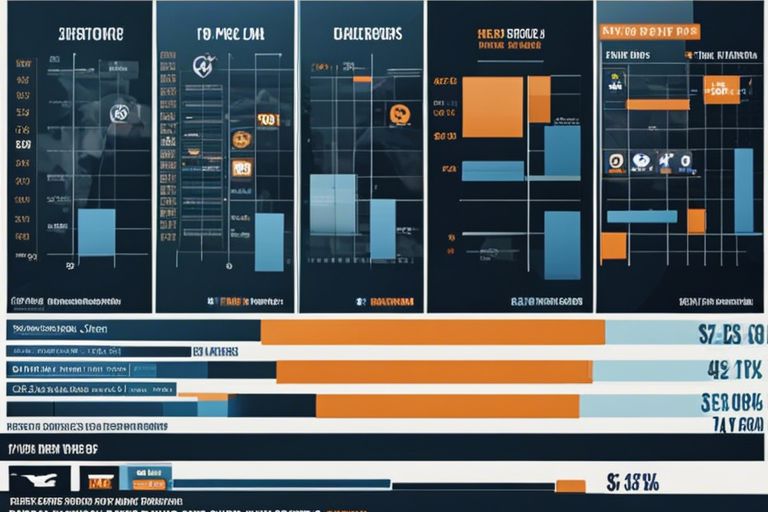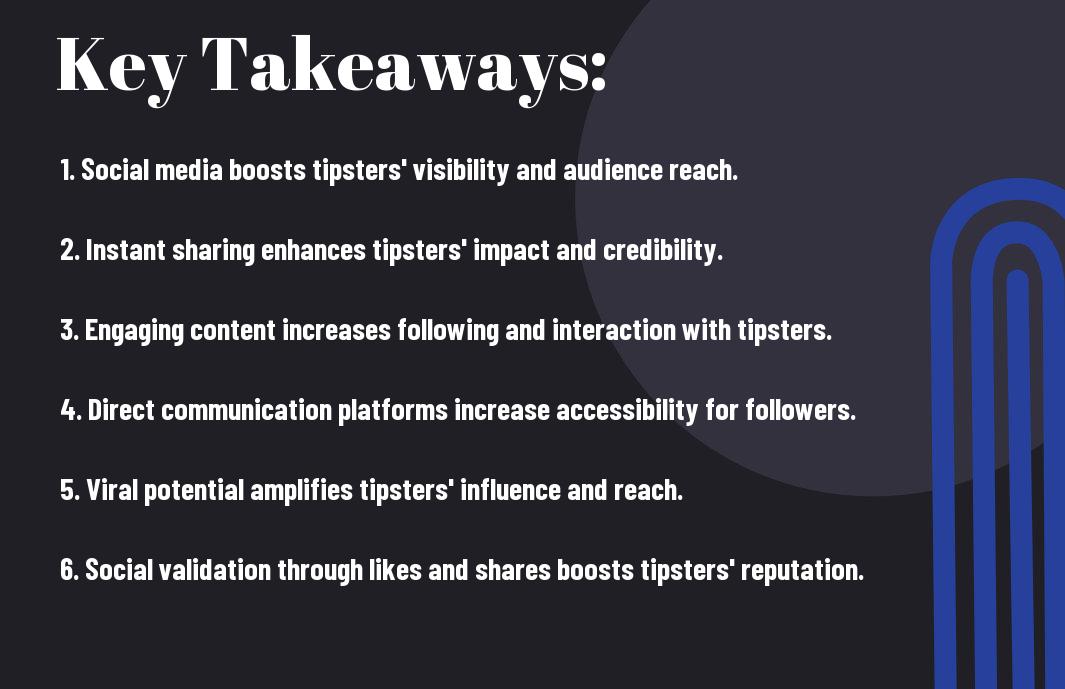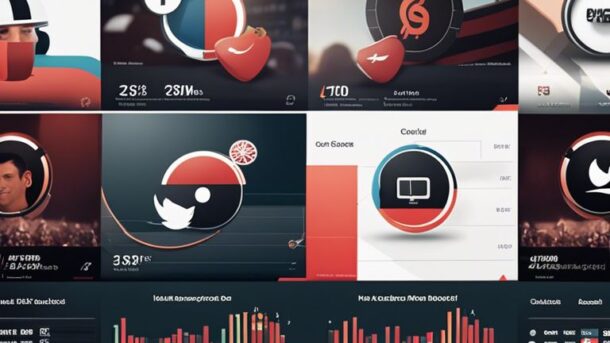It’s fascinating to explore how social media platforms have revolutionized the world of sports betting tipsters, amplifying their reach and impact on a global scale. In this insightful article, you will uncover the profound effects of social media on sports gambling, delving into the strategies and tactics that tipsters employ to engage with audiences and drive success. To further understand the dynamics at play, check out Sports Gambling and Its Impact on Sports Marketing for a comprehensive analysis.

Key Takeaways:
- Increased visibility: Social media platforms enable sports betting tipsters to reach a broader audience and increase their visibility within the betting community.
- Enhanced engagement: Interaction with followers on social media allows tipsters to build a loyal following and establish credibility, leading to higher engagement levels and impact.
- Risk of misinformation: While social media can amplify the influence of sports betting tipsters, it also poses the risk of spreading misinformation and promoting irresponsible gambling behavior if not monitored properly.


The Rise of Social Media Influencers in Sports Betting
While sports betting has been around for a long time, the rise of social media has revolutionized the way tipsters share their insights and betting advice. Through platforms like Twitter, Instagram, and YouTube, individuals with a knack for sports analysis and predictions have gained significant followings, becoming influencers in the world of sports betting.
The Democratization of Sports Betting Advice
Democratization has been a key factor in the proliferation of sports betting advice on social media. Previously, getting tips and insights would often come from established experts or insiders in the industry. However, with social media, virtually anyone can share their thoughts and predictions with a wide audience. This has led to a more diverse range of perspectives and strategies being shared, giving you a plethora of options to consider when placing your bets.
The Power of Social Media Platforms
The power of social media platforms in amplifying the reach and impact of sports betting tipsters cannot be underestimated. Platforms like Twitter allow tipsters to reach thousands, if not millions, of followers instantly with their predictions and analysis. This real-time dissemination of information can significantly influence betting patterns and odds, making social media a game-changer in the world of sports betting.
Media-savvy tipsters have leveraged the interactive nature of social media to engage directly with their followers, building a loyal community around their predictions. This two-way communication not only adds a personal touch to the betting experience but also builds credibility and trust between the tipster and their audience.
How Social Media Amplifies the Reach of Tipsters
One way that social media amplifies the reach of sports betting tipsters is through the viral nature of online content. When tipsters share their picks and insights on platforms like Twitter, Facebook, or Instagram, their followers can easily like, share, and retweet their posts, causing them to spread rapidly across the platform. This can lead to an exponential increase in visibility as more users engage with the content and share it with their own networks. If you want to probe deeper into how social media has revolutionized the sports betting landscape, you can explore more in an article on The Impact of Social Media on Sports Betting Culture.
The Viral Nature of Online Content
Media plays a significant role in propelling sports betting tipsters’ content to a wider audience. Through engaging posts, videos, or infographics, tipsters can attract the attention of users who may not have discovered them otherwise. This organic sharing of content enhances the tipsters’ reach beyond their immediate followers, potentially gaining them new fans and followers in the process.
The Role of Hashtags and Trending Topics
Online platforms utilize hashtags and trending topics to categorize content and make it more discoverable to users interested in specific subjects. By including popular hashtags related to sports betting or specific games/events, tipsters can increase the visibility of their posts to a broader audience. This strategic use of hashtags can make their content more accessible and help them tap into ongoing conversations within the sports betting community.
One factor that significantly impacts the reach of sports betting tipsters on social media is the use of influencer marketing. By collaborating with influencers in the sports and betting niche, tipsters can leverage the influencers’ large followings to promote their picks and analyses to a wider audience. This partnership can drive more traffic to the tipsters’ profiles, increase their credibility, and attract new followers who trust the recommendations shared by the influencers.
Influencer marketing is a powerful tool that can help tipsters expand their reach and connect with a broader audience. By partnering with influencers who align with their brand and target market, tipsters can amplify their message and reach potential followers who may not have come across their content otherwise.
The Anatomy of a Successful Sports Betting Tipster on Social Media
To truly understand the anatomy of a successful sports betting tipster on social media, you must first recognize the key components that contribute to their influence and impact. From building a personal brand to creating engaging content, and leveraging interactions and community building, every aspect plays a crucial role in shaping their online presence and reaching a wider audience.
Building a Personal Brand
On social media, building a personal brand is imperative for sports betting tipsters. Your brand is what sets you apart from others and helps establish credibility and trust with your followers. By being consistent in your messaging, sharing your expertise, and showcasing your unique personality, you can attract a loyal following that values your insights and predictions.
- Consistency in messaging
- Sharing expertise and insights
- Showcasing your personality
Perceiving yourself as a brand and understanding how to effectively communicate your value proposition is key to standing out in a crowded online space.
Creating Engaging Content
Betting tips and predictions are the core of your content, but to truly engage your audience, you need to go beyond just sharing picks. Your content should be informative, entertaining, and visually appealing to capture the attention of your followers. Utilize different formats such as videos, infographics, and live streams to keep your audience engaged and coming back for more.
As a tipster, your goal is not only to provide accurate predictions but also to create a community around your content where followers can interact, share insights, and learn from each other.
Leveraging Interactions and Community Building
Media platforms offer a unique opportunity for sports betting tipsters to interact directly with their audience and build a community of like-minded individuals. By responding to comments, asking for feedback, and hosting Q&A sessions, you can foster a sense of belonging among your followers and establish yourself as a trusted authority in the industry.
Interactions with your audience are not just about answering questions or providing tips; they are about building relationships and creating a loyal community that will support you in the long run.
The Dark Side of Social Media Influence in Sports Betting
The Spread of Misinformation
One of the significant downsides of social media influence in sports betting is the rampant spread of misinformation. With the ease and speed at which information can be shared on platforms like Twitter, Facebook, and Instagram, inaccurate tips and advice can quickly gain traction. This can lead to unsuspecting individuals placing bets based on faulty or misleading information, ultimately resulting in significant financial losses.
The Dangers of Unregulated Advice
Influence plays a crucial role in how individuals perceive and act upon advice provided on social media by sports betting tipsters. Without proper regulation and oversight, there is a serious risk of individuals being misled by self-proclaimed experts who may not have the necessary expertise or knowledge. This can lead to a false sense of security and misguided decision-making when it comes to betting on sports.
To mitigate the dangers of unregulated advice, it is necessary to exercise caution and discernment when consuming sports betting tips from social media platforms. Take the time to research and verify the credibility of tipsters before acting on their recommendations. Do not forget, just because someone has a large following or flashy posts does not guarantee their accuracy or reliability.
The Risk of Addiction and Problem Gambling
Dangers associated with social media influence in sports betting also include the heightened risk of addiction and problem gambling. The constant stream of tips, promotions, and success stories on social media can create a false sense of invincibility and lure you into compulsive betting behavior. This can lead to detrimental effects on your financial well-being, mental health, and overall quality of life.
Advice is to practice responsible gambling habits and set clear boundaries for your betting activities. If you feel like your gambling behavior is becoming problematic or if you’re struggling to maintain control, seek help from support groups or professional resources. Do not forget, your well-being is more important than any potential winnings from sports betting.
The Impact of Social Media on Traditional Sports Betting Media
The Shift from Print to Digital
Now, with the pervasive presence of social media, traditional sports betting media has experienced a significant shift from print to digital platforms. Any avid sports bettor can attest to the fact that obtaining betting tips and insights has evolved from relying solely on newspapers and magazines to accessing a plethora of information online. This transition has not only made sports betting content more accessible but has also allowed for real-time updates and a greater variety of sources for you to consider when making your betting decisions.
The Rise of Online Sports Betting Publications
Sports betting publications have seen a meteoric rise in popularity thanks to social media platforms. You are no longer limited to a few established sports betting magazines or newspapers; instead, you have a sea of online resources at your fingertips. These online publications often provide a more diverse range of opinions and analyses on various sports and events, giving you a more comprehensive view to help inform your betting strategies.
Understanding the dynamics of the online sports betting landscape can be daunting, but with the assistance of social media, you can easily navigate through different publications, follow expert tipsters, and engage with other bettors to exchange ideas and insights.
The Changing Role of Journalists and Experts
Journalists and sports betting experts have had to adapt to the digital age brought on by social media. The traditional role of journalists as mere purveyors of information has shifted towards a more interactive and engaging approach. Today, these professionals often engage directly with their audience through social media platforms, providing real-time updates, analysis, and even one-on-one interactions with followers like you.
Plus, the rise of social media has democratized the sports betting landscape, allowing aspiring tipsters and experts to gain credibility and reach a wider audience. This means that you have a broader array of voices and perspectives to consider when seeking out betting tips and advice.
Regulating Social Media Influencers in Sports Betting
The Need for Industry Oversight
All social media influencers, including sports betting tipsters, need to be regulated to ensure transparency and accountability in their activities. This is especially crucial in the sports betting industry, where tips and advice can have significant financial implications for followers. By having proper oversight in place, you can trust that the information you receive is reliable and not influenced by undisclosed partnerships or personal gains.
The Challenges of Monitoring Online Activity
One of the primary challenges in regulating social media influencers in sports betting is the constantly evolving nature of online platforms. With new channels and trends emerging regularly, keeping track of all influencers and their activities can be a daunting task. Ensuring compliance with ethical standards and advertising laws becomes even more challenging in this rapidly changing landscape.
For instance, the global reach of social media means that influencers can attract followers from diverse jurisdictions, each with its own regulations regarding sports betting and advertising. As a result, monitoring and enforcing compliance across different regions can become a complex and multifaceted endeavor.
Potential Solutions and Best Practices
Any regulation of social media influencers in sports betting should focus on promoting transparency, disclosure of affiliations, and the protection of consumers’ interests. Implementing clear guidelines and standards for influencers to follow can help ensure that their content is fair, accurate, and responsible. By holding influencers accountable for their recommendations and actions, you can make more informed decisions when following their advice.
Understanding the challenges of monitoring online activity, regulatory bodies could collaborate with social media platforms to develop tools and algorithms that flag suspicious or misleading content. By leveraging technology to aid in the monitoring process, regulators can more effectively identify and address potential issues before they impact consumers.
To wrap up
Following this exploration of how social media influences the reach and impact of sports betting tipsters, it’s clear that platforms like Twitter, Instagram, and Facebook play a significant role in amplifying the visibility of these individuals. By leveraging these channels, tipsters can connect with a wider audience, share their insights, and potentially attract more followers seeking betting advice. However, it’s important to approach these tips with caution and always do your own research before making any bets.
If you’re interested in delving deeper into the world of sports betting and social media, you may find the article ‘The Role of Social Media in Sports Betting’ on BeSoccer to be a valuable resource. Exploring the intricate relationship between these two realms can provide further insights into how digital platforms shape the betting landscape and influence the decisions of punters worldwide.
The Role of Social Media in Sports Betting – BeSoccer
FAQ
Q: How does social media influence the reach of sports betting tipsters?
A: Social media platforms provide sports betting tipsters with a wide-reaching audience and the ability to engage directly with their followers. Tipsters can easily share their tips, analysis, and insights with a large number of people, increasing their reach and potentially attracting new followers.
Q: What impact does social media have on the credibility of sports betting tipsters?
A: Social media can both enhance and challenge the credibility of sports betting tipsters. On one hand, tipsters can build credibility by sharing accurate and successful tips, engaging with followers, and establishing a transparent track record. On the other hand, the anonymity of social media can make it easier for tipsters to fabricate results or mislead followers, so it’s important for users to exercise caution and do their own research.
Q: How does social media affect the regulation of sports betting tipsters?
A: Social media poses challenges to the regulation of sports betting tipsters as it allows tipsters to operate across borders and reach a global audience. Different countries have varying regulations regarding sports betting and gambling, which can make it difficult to enforce standards of transparency and accountability. Regulators may struggle to monitor and control the activities of tipsters on social media platforms, leading to potential risks for consumers.



